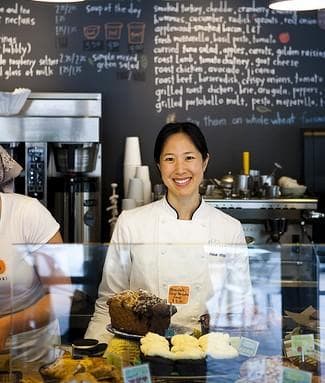Advertisement
Celebrity And The Chef
I don’t fancy myself a celebrity chef. Yes, I've been on a TV show or two and I've written a cookbook that sold pretty well. But at the end of the day: I love to make cookies and I own a few bakeries and a little Asian restaurant (with my husband).
Yet as I write this I find myself partially reclined, in a plush first class seat en route to Honolulu to participate as a guest chef in an Hawaii’s annual food and wine festival. As if the prospect of being treated to a week in paradise isn’t overwhelming enough, once there I’ll be a guest at glitzy galas and celebrated for my confections. And while the “grilled fresh catch of the day” is, by the flight attendant’s own rueful admission, quite the misnomer, everywhere I turn I’m being treated like I’m a celebrity.
Let’s not forget that I bake cookies for a living. The dissonance is not lost on me.
Some aspiring chefs seem more motivated by dreams of celebrity than of culinary greatness.
In the early 1990s when I first stepped into a professional kitchen to dice onions and zest lemons, I had never heard the phrase “celebrity chef.” Hardly anyone else had either. Celebrities were movie stars, musicians or athletes – the people you read about in People Magazine. Certainly not someone like me.
But something changed. Today's chefs star in TV shows and their memoirs (not just their cookbooks) spend weeks atop bestseller lists. They are showered with boondoggles, treated to glamorous accommodations, and have bands of passionate – sometimes downright fanatical – followers.
It’s changing our culture and the role a chef plays in his or her restaurant. It’s also drawing a new base of aspiring chefs motivated more by their dreams of celebrity than of culinary greatness.
Popular television programs like Top Chef, Iron Chef and Cupcake Wars are thrilling. I confess that I love watching them as much as the next guy, but classifying them as “reality” strikes me as almost dishonest. Hyper dramatized and heavily produced as they are, they present a very misleading picture – the antithesis of reality. I worry they give enthusiastic home cooks a distorted view of the business.
If you like to cook, you imagine that you too could chuck it all and follow your dream of opening a quaint neighborhood bistro. I get emails daily from earnest wannabes that go something like this: “You will probably think this is unusual but I would like to give up my investment banking/medical/law career and become a chef.” I don't find it unusual at all. But I fret constantly about how many of them will actually make it once they see what it is really like.
I remember the first chef I worked for telling me that restaurant people are fringe dwellers - the happy misfits of the world. Whether you’re a sous chef, a line cook or a dishwasher – the hours are long and late and when everyone else is out having fun, you are working. You earn your stripes not by graduating from culinary school – but by slowly climbing your way up the ladder, one agonizing step at a time. It takes years – decades even – before you’re rightfully dubbed “chef.”

It’s also pricey. One of my line cooks – a recent graduate of culinary school – says that in his first year class of 76 people, only 25 ended up graduating and now just 10 have actual cooking jobs. At $35 thousand for one year of tuition, it is an expensive reality check.
Then, once you have the training and the experience under your belt, in the fickle restaurant business, there are no guarantees. For every one celebrity chef sipping champagne and eating caviar poolside between cooking demonstrations – there are 100 equally talented and deserving chefs struggling to make a name for themselves.
In my case, it was luck. I am by nature shy; if I'm around lots of people, my instinct is to retreat. One of the things that drew me to the kitchen in the first place was that I liked working in solitude, as I mixed the ingredients of an intricate cake or rolled out a perfect pâte feuilleté, behind closed doors.
But all that changed in 2007 when the Food Network’s Bobby Flay challenged me to a "Throwdown" and put my bakery Flour and me in the national spotlight. In one 30 minute episode, my life was turned upside down.
"Throwdown" opened doors to media appearances and magazine articles and pretty soon I was spending more of my days talking about baking and cooking – than I was actually baking and cooking. In an industry notorious for its high failure rate, I quickly came to realize that the PR/marketing that came with appearances and media coverage was as crucial to our business as making sure our scones were flaky and our service hospitable.
Today being a chef means juggling what we’re trained to do with what the public clamors for us to do. So though I would rather peek out at the world behind the comfortable crack of the kitchen door, I feed the benevolent beast and enable the glamorization of our industry. It's restaurant Darwinism, and today it is a key ingredient of being – and staying – a successful chef.
This program aired on September 13, 2012. The audio for this program is not available.